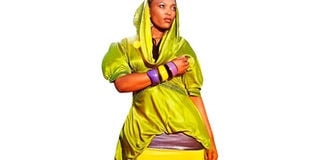Lucky Dube lives through his daughter

What you need to know:
The pressure that comes with being her father’s daughter and managing the expectations of her music is something she must deal with, but Nkulee is ready to soar beyond her dreams to create her own legacy in the music industry, writes Billie Odidi
This August, South African music star Lucky Dube would have celebrated his 47th birthday. Sadly, the most successful African reggae artiste of his generation was killed by a group of thugs in a Johannesburg suburb in 2007.
The legacy of the late Dube, who pioneered a distinctively African variations of reggae, now rests on the shoulders of his 24-year-old daughter, Nkulee.
The singer and songwriter, blends ethno – soul, jazz with reggae and dancehall and has launched her international career with her father’s 10-piece outfit the One People Band. Last year she toured the world with this tight group of musicians who made Lucky’s stage shows some of the most electrifying performances by any African artiste.
“I only toured with my father’s band after his death because during his career, he wanted to keep his family and his career apart,” she says.
Her experience with the band has made her realise that their success was brought about by a very professional leadership, which has stayed with them beyond the death of Lucky.
“They say he was a very strict boss and none of the musicians could get away with doing things that were not for the benefit of the band,” she says.
Going contemporary
While Lucky Dube is remembered for his trademark melodious reggae with the socially conscious edge of timeless songs like Slave, Prisoner and House of Exile, his daughter performs a smoother contemporary brand of reggae, sometimes veering in to R&B and soul.
Nkulee prefers to talk about the issues that surround her as a young person. “It is not that I don’t care about politics, but there are different concerns for the youth today, like drugs, HIV and AIDS, which I can use my status to speak about,” she says.
Carrying the name of Africa’s most successful reggae superstar must have weighed heavily on the shoulders of the young Dube, during her sessions in a studio in Johannesburg working on her debut album.
She was signed by South African record label Native Rhythms Productions for her 11 –song debut album My Way.
Besides the obvious influence of her father, Nkulee draws from an eclectic musical background ranging from South African jazz great Lebo Mathosa to soul and dancehall.
“Working with some of the greatest musicians from South Africa and Germany made me feel like a real artiste,” says Nkulee when asked about the highlight of working on the album.
Her debut single Who Dem, a bouncy dancehall groove, written by Jah Seed of the South African kwaito/reggae group, Bongo Maffin, had its video shot in Johannesburg before Nkulee embarked on her current tour.
The song talks about giving respect to Rastafarianism for its values of peace, life, humanity, tranquility and love the video splashes the images of Bob Marley and Lucky Dube.
Stepping out of her father’s shadow
“I want to do things my way. My sound is unique and I want people to understand and appreciate it,” she says. “I am creating new trends in the world of music.”
However, she acknowledges the pressure that comes with being her father’s daughter and managing the expectations of her music. “It is amazing and very scary at the same time because of the pressure that comes with being Lucky Dube’s daughter,” she says.
Last year Nkulee joined the ‘Lucky Dube Celebration Tour, a tribute to her late father with performances of his songs plus new and original music his former band has recorded since his death.
She received an uproarious reception from the crowds during the tour; from people who obviously felt her father’s presence, whenever she was introduced on stage. “Wow! I get to receive some of the love that the world had for my father during this tour. It can be very emotional for me when I see this reaction.”
She has also been in demand at some of Europe’s biggest festivals. The theme of the annual African Music Festival in Germany was ‘Children of the Legends.’ Among the artistes at the 5-day event held in the town of Emmendingen last week was Nkulee, partly fulfilling the organisers’ long -held ambition of having her father perform at the festival.
The shadow of her iconic father is something Nkulee cannot escape from. After all, the charismatic Lucky was a well-loved figure around the world, released more than 20 albums and sold millions of these records in a career spanning two decades.
“There have been plenty of expectations and the fact that I do reggae music, like my father, also increases this pressure,” says Nkulee.
Her shows are never complete without a tribute to her dad’s memory and she usually picks some of his best known songs like Prisoner whose lyrics are familiar to the crowds wherever in the world she performs.
Her current world tour, which kicked off in July, has taken her from U.S and Canada to Germany and Austria and ends in August.
Breaking though on the world stage
Riding on a famous family name has been the key for this young musician to break through on the world stage. With the exception of a select few, many other African artistes have struggled to find a sound that can create an impact beyond their own countries
“African musicians must realise that the world will always fall in love with a fresh sound rather than a poor imitation of what is already on offer,” says Nkulee.
Nkulee’s half sister, Bongi Dube is also a recording artiste; though her jazz and house music style is markedly different from the rest of the family’s reggae staple. Unlike Nkulee, she has appeared rather coy about her links to her famous father, at least publicly.
It is said that executives at Gallo Music had no idea they were signing the daughter of one of their label’s biggest stars when they gave Bongi her first deal in 2007, before Lucky’s death.
The music of the man celebrated as Africa’s Reggae King continues to resonate with the masses across Africa because as he said, his stance was not political; it was about highlighting the truth.
His offspring may have chosen different styles of music, but there is no denying the weight that the name Dube carries, wherever in the world the sisters are introduced.
Monitor correspondent




